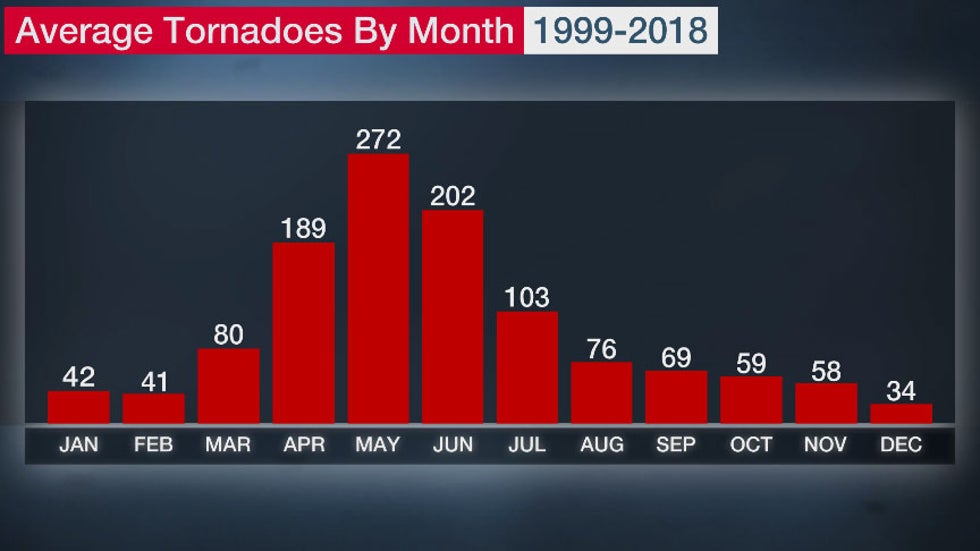The number of tornadoes that have touched down on United States soil so far this May is currently the lowest in at least 50 years, a sharp contrast to one of the busiest Aprils for twisters on record.
May is typically the most tornadic month in the U.S., averaging 272 tornadoes each year between 1999 and 2018. But as of May 25, only 49 tornadoes had been confirmed throughout the month, according to Evan Bentley, a severe weather meteorologist at NOAA's Storm Prediction Center (SPC).
The last time May had fewer than 100 tornadoes was in 1970, when 88 touched down in the U.S., Bentley tweeted. The least-tornadic May was back in 1952, when only 34 twisters were confirmed during the month, according to data from the SPC.
 Each bar depicts the average number of tornadoes for that month in the United States.
Each bar depicts the average number of tornadoes for that month in the United States.It should be noted that the SPC lists 112 preliminary tornadoes in its database this month through May 25, but that includes all reports from every National Weather Service office, some of which may be from the same tornado, therefore counting it more than once.
The actual number of tornadoes won't be known until a later time, but it's likely closer to Bentley's estimate of 49.
 Each dot on the map represents a preliminary tornado report from the National Weather Service between May 1 and May 27, 2020.
Each dot on the map represents a preliminary tornado report from the National Weather Service between May 1 and May 27, 2020.The greatest tornado risk during May is in an area from southwestern Iowa to northern Texas, as the map at the top of this article shows.
Parts of that corridor have been relatively tornado-free this May, most notably much of Nebraska, Kansas and Oklahoma.
This can also be seen on the map below, showing the number of tornado watches issued by the SPC since the beginning of the year. Note the lack of tornado watches over Nebraska, Kansas and western Oklahoma, in the heart of Tornado Alley.
 The various shades of red indicate the number of tornado watches that have been issued by NOAA's Storm Prediction Center so far in 2020.
The various shades of red indicate the number of tornado watches that have been issued by NOAA's Storm Prediction Center so far in 2020.Only 21 tornado warnings have been issued in Kansas so far this year, the NWS office in Wichita tweeted. That's the third-fewest number of tornado warnings to date in the state in records dating to 1990. On average, January through May averages about 80 tornado warnings in Kansas.
This quiet May for tornadoes is largely due to a pair of unfavorable large-scale weather patterns that have persisted for most of the month.
Meteorologist Jonathan Belles explains these patterns in great detail here.
The Weather Company’s primary journalistic mission is to report on breaking weather news, the environment and the importance of science to our lives. This story does not necessarily represent the position of our parent company, IBM.
The Weather Company’s primary journalistic mission is to report on breaking weather news, the environment and the importance of science to our lives. This story does not necessarily represent the position of our parent company, IBM.

No comments:
Post a Comment